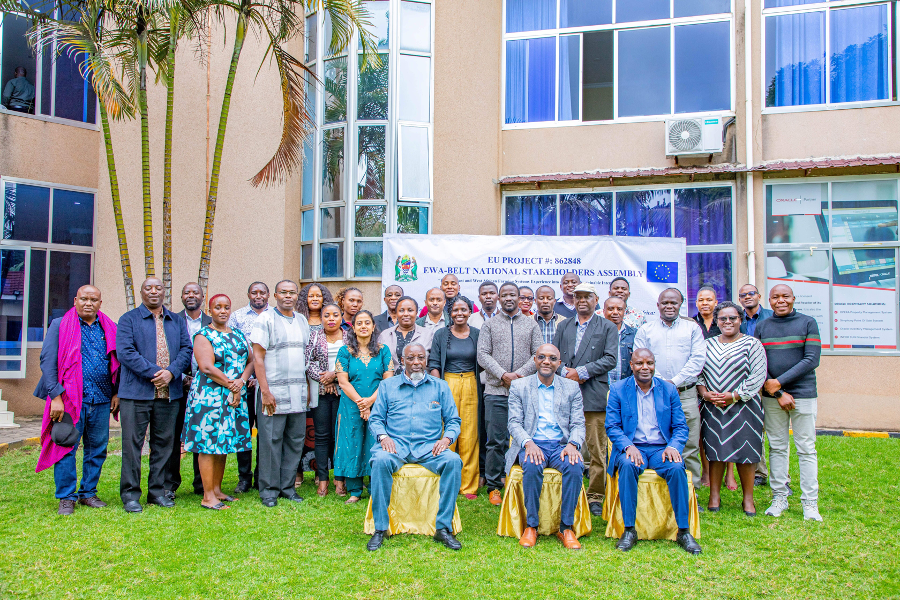Exploring the Potential of Fonio for Social Security, Cultural Preservation, and Economic Development in Ghana
- OCCAM - Observatory on Digital Communication

- Nov 12, 2024
- 3 min read
Updated: Nov 15, 2024
During the First Session of the EWA-BELT General Assembly, held on September 24, 2024, in Milan, Dr. Joseph Adjebeng-Daquah presented on behalf of the Council for Scientific and Industrial Research – Savanna Agricultural Research Institute (CSIR-SARI) in Ghana, focusing on maximizing the potential of neglected and underutilized species (NUS) like fonio within the EWA-BELT Project.

In Ghana, Neglected and Underutilized Crop Species (NUS), such as fonio, have significant potential for social security, nutritional diversity, and cultural preservation. These crops contribute to food security and help maintain the cultural heritage associated with indigenous agricultural practices. Fonio, gluten-free and nutritionally rich, meets the rising demand for health-conscious and alternative dietary options, providing an appealing crop for local farmers. For instance, a bowl of fonio often fetches a higher price than common cereals, underlining its income-generating potential.
Dr Adjebeng-Danquah explained how CSIR-SARI, through the EWA Belt Project, has focused on understanding the characteristics and production potential of fonio. Despite its importance, Ghana lacks a comprehensive genetic profile for fonio, and there is limited information on its morphological and molecular diversity. Dr. Adjebeng-Danquah outlined the work of Dr. James Kombiok and colleagues in 2012 and laid the groundwork by assessing the morphology of fonio, but broader and more in-depth studies are needed.
In the absence of a recognized agronomic package for fonio, farmers in Ghana generally rely on farming practices designed for other cereals such as maize or rice. To address this, CSIR-SARI began evaluating fonio accessions with the active participation of farmers in four districts: West Mamprusi, Savelugu, Talensi, and Nabdam. Using a randomized complete plot design, researchers assessed key agronomic parameters and invited local farmers to observe, evaluate, and help select the most promising lines.
Dr Adjebeng-Danquah showed how early results from these trials were promising, with yield assessments showing that fonio yields were often above 1 tonne per hectare - an encouraging result in regions where staple crop yields sometimes fall short of this benchmark. In addition, certain lines, such as 'Nfonkpa' and 'Namba,' matured earlier (within 80 to 90 days), offering farmers the opportunity to diversify their planting schedules and better manage crop rotations. These early-maturing lines will now be disseminated more widely in five additional districts, enabling more farmers to try and benefit from fonio cultivation. In the trials, fonio was drilled rather than broadcast, a planting method traditionally used by local farmers. This adaptation demonstrated the feasibility of introducing more efficient planting techniques to improve productivity.
CSIR-SARI’s long-term strategy includes broadening the genetic diversity of fonio and developing officially recognized varieties for Ghana. The current research focuses on genetic and morphological evaluations of fonio accessions, aiming to assess its adaptability to diverse environments and agronomic conditions.
Dr. Adjebeng-Daquah warned that several areas require further research to unlock the full potential of fonio: for example, researchers are now investigating the impact of moisture stress on fonio yield, a critical factor given the predicted changes in rainfall patterns due to climate change. Developing resistance to lodging and shattering and optimizing storage and post-harvest practices are also needed to improve Fonio's commercial viability.
CSIR-SARI also plans to investigate weed and pest management strategies tailored to fonio. Ants, for example, pose a particular challenge when fonio seeds are harvested directly from the panicles. Finally, diversifying fonio products and exploring its potential in food processing could expand market opportunities and further incentivize farmers to adopt and grow this climate-resilient crop.
Follow us on social media to stay up to date!
EWA-BELT Project |
Website: www.ewabelt.eu Facebook: ewabelt.project Instagram: ewabelt_project X: ewabelt_project LinkedIn: showcase/ewa-belt YouTube: occam3039 Joint YouTube channel: @sfs35 |
For media inquiries, please contact:
OCCAM - Observatory on Digital Communication





Comments